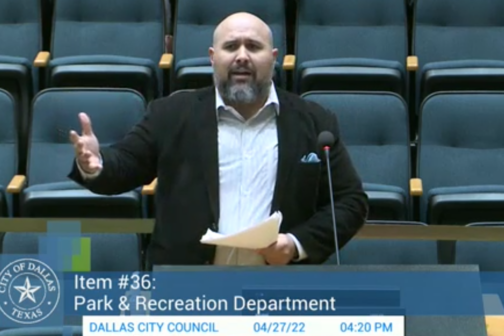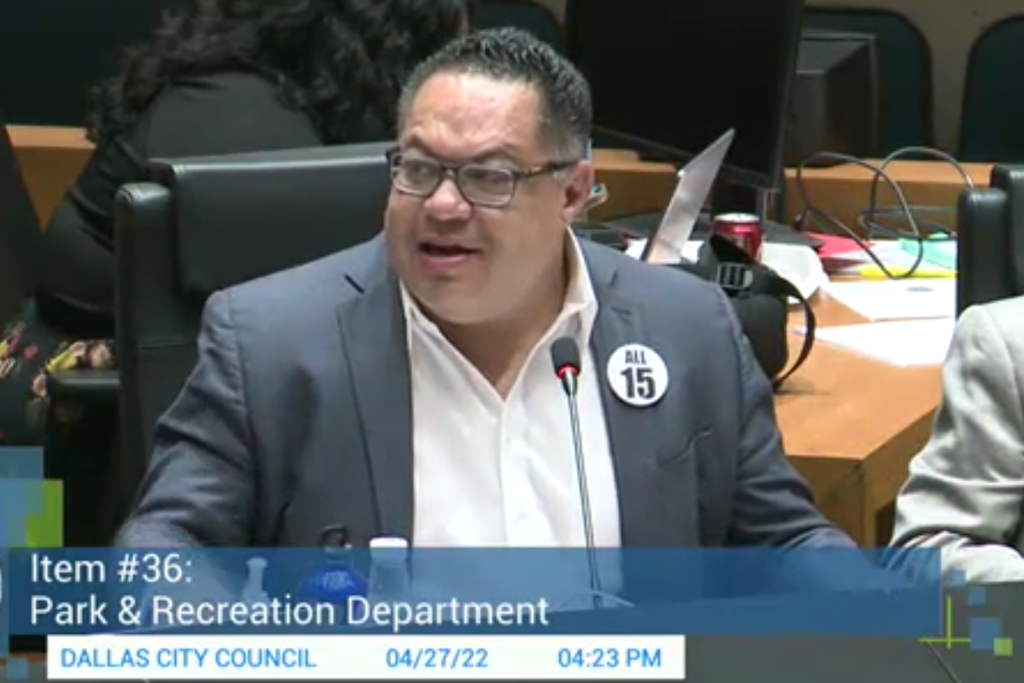Before we get to a conflict of interest—and I mean that generally, not as the city defines it in its ethics policy—involving millions of dollars, you need some context. Buckle up. This is a journey.
Yesterday, the Dallas City Council spent over an hour debating a procurement contract that the runner-up in the bidding process had appealed. The Parks Department and a third-party design consultant had deemed that the second-place finisher did not have the qualifications to do the job for which it was applying. The City Attorney’s Office had found that the process had met the city’s legal standards.
But the company in question, Gadberry Construction, had bid about $750,000 below the bid of the company that had won the project, the Fain Group.Dustin Gadberry, the owner and operator of lower bidder, had appealed this decision, arguing that the lowest bid should have won the contract. The city said, no, it’s actually the lowest responsible bid, and Gadberry didn’t provide enough evidence that it could pull off the job.
Still with me? The turn is up ahead.
Three council members spoke in support of delaying the approval of the Fain Group’s bid and reviewing whether the city’s request for bid was up to snuff. Those in favor of delay were District 14’s Paul Ridley, who represents the district where the project is located and pulled the item from the consent agenda for discussion; District 2’s Jesse Moreno, who represents the neighboring Medical District; and District 6’s Omar Narvaez, just over the river in West Dallas.
Ridley wanted to ensure that Gadberry had enough information to understand what the city was looking for. He told me after the vote, “I was not satisfied that the bid instructions containing the qualifications of bidders was specific about the amount of experience and type of experience that were minimum requirements for submitting a bid.”
Basically, Ridley wanted to make sure Gadberry had a fair shake. The City Attorney’s Office said Gadberry did. Gadberry says he didn’t and that he could save the city $750,000. Ridley wanted to give the City Attorney’s Office two weeks to make sure everything was buttoned up.
One thing went unsaid during this debate: Gadberry has been Narvaez’s campaign treasurer since he first ran for council, in 2016, and at no time during the discussion did Narvaez reveal this fact. Narvaez spoke passionately about delaying the matter and even gave up some of his allotted speaking time so that Gadberry could address the Council directly.
Ridley told me afterward that he was unaware of Gadberry’s relationship to Narvaez. “Today is the first time I’ve heard of this,” he said.
The project in question is a key part of the 50-mile LOOP Trail, which will connect Dallas’ existing hiking and biking trails and add a new path through the Trinity Forest. The Council was voting on a 1-mile extension known as the Hi-Line Connector that will tie the Katy Trail into Victory Park on its way to the Design District and the Trinity River. I wrote about it in 2019, which you can find here.

The project includes constructing a protected mid-intersection pedestrian crossing on Oak Lawn and into the Design District, a trail down the middle of an existing median, and new pedestrian infrastructure below Interstate 35. According to Chris Turner-Noteware, the city’s assistant director of street and mobility services, the project is more of a “roadway” project than a “trail project.” And staff and its partners determined Gadberry didn’t have the experience necessary to manage all these things. Ridley wanted to make sure the city formally asked for those specific qualifications in its procurement document, since the city used those parameters as the reason it went with the higher bid.
The Hi-Line Connector is paid for with money from two sources: federal dollars controlled by the Texas Department of Transportation and Tax Increment Financing money from the Sports Arena TIF in which the project resides. That TIF money, which is $3.5 million, won’t show up until the project is completed.
That means the Circuit Trail Conservancy, the nonprofit building the LOOP, had to negotiate a loan with a bank. It needed City Council to approve the bid in order to close on that loan. Not so fast, said Ridley. “The reason we need to stop this is because of a legal issue and that is why the city attorney needs to examine this legal issue,” Ridley said. “What are qualifications listed in the instructions to bidders in the bid package?”
Narvaez agreed with his colleague’s questioning. “Gadberry is a Design District, locally-owned business,” he said during the meeting. “This project is a Design District slash Medical District project that would close up part of the LOOP Trail … . It behooves me to understand how a bidder can come in at almost a million dollars less and all of a sudden the Parks Department decides, ‘Oh, we’re going to go with this other group instead.’”
Narvaez was not explicitly supporting his campaign treasurer. But he was supporting a motion to delay for a review that could have resulted in Gadberry winning the contract. If you’re watching yesterday’s meeting without Narvaez’s campaign finance forms in front of you, this context is absent.
Narvaez told me this morning that he did nothing wrong during the debate. “The city attorney said that as long as I had no financial interest with Gadberry Construction and Dustin Gadberry that I did not have to recuse myself,” Narvaez said. “I always check with the city attorney. I’m probably the No. 1 city attorney person. ‘Can I do this? Can I not do that?’ It’s really easy to break rules, and you don’t realize it because we have so many.”
He also believes that his relationship to Gadberry was not relevant to the matter at hand. And maybe it isn’t. But the public didn’t have a chance to determine that.
Let’s get to the merit of the argument against awarding the contract to the Fain Group. (Fain’s bid was for about $11.5 million; Gadberry’s was around $750,000 below that.)
After a question from Councilwoman Paula Blackmon, Parks Director John Jenkins detailed the procurement process. I won’t burden you with a walk through the weeds, but the takeaway was this: in reviewing the bid, staff found that Gadberry had not provided examples of work performed over the last three years in similar scope and scale to what the Hi-Line Connector will require. Gadberry has performed work that cost about the same amount as this project, but, Jenkins said, nothing with as many variables as the Hi-Line Connector will present. So staff deemed Gadberry to be “unresponsive.”
Those variables are as follows: has the bidder worked in the street right of way? Has the bidder worked with traffic signals?Has the bidder worked in the middle of a road with traffic going down both sides construction is underway?Has the bidder worked on an active bridge?Has the bidder worked in these types of conditions?
Jenkins says he reviewed the application with staff four times. He says he personally followed up with Gadberry, requesting that the company submit these specific examples. What the company provided didn’t match what the city was looking for. At one point, Gadberry missed a five-day deadline to submit information by three days, Turner-Noteware said.
Dustin Gadberry opened the discussion during public comment by alleging that what “can be at best defined as a complete violation of procurement standards here or, at worst, a backroom deal that needs further investigation.” He, too, did not mention his connection to the councilman.
After Jenkins detailed the review process and the City Attorney’s Office said everything had been deemed above board, nine council members voted against Ridley’s motion to delay, freeing the body to vote on awarding the contract to Fain. Enough of the Council voted in favor of awarding Fain the contract that Mayor Eric Johnson didn’t even have to call a record vote. Gadberry said he planned to file an injunction.
The City Attorney’s Office hasn’t responded to my request to confirm that Narvaez received guidance on the matter of his recusal. So we have to take him at his word there. But the city’s ethics rules wouldn’t appear to require Narvaez to leave the chambers during the debate because of his relationship with Gadberry. But without the context, the public could walk away with the impression that the city was blowing cash and that might not be the case.
But Moreno, the other outspoken supporter of Ridley’s amendment, fell to the background during the discussion. Narvaez used all of his allotted speaking time. He told the mayor he felt it was “a shame” that the city wasn’t doing all it could to verify that the language of the bid was clear.
Maybe it was, maybe it wasn’t; the city won’t provide the RFP without an open records request, a spokeswoman said, which could take days or weeks to process. What we know at face value: Narvaez made a passionate plea to delay the vote, a move that could have helped his friend and campaign treasurer.
On the phone with me, Narvaez told me this was strictly about the money, how $750,000 could build three playgrounds in West Dallas. He spoke about the council’s push to support local contractors. He also called a point of order while Turner-Noteware was describing the procurement process and later demanded to know the names of the people who work for the third-party design group, SWA, that helped the city review applicants and is serving as the design lead on the project.
Late in the discussion, Councilman Adam Bazaldua said the following: “I don’t believe that it is a good precedent to set that any bidder that doesn’t get chosen for a job can just send an email to their council member and essentially convolute the procurement process.”
This wasn’t just any constituent. This was that councilman’s campaign treasurer and has been for the past six years. And that councilman made the decision not to reveal that fact during the discussion.
Was it a violation of the city’s ethics rules? Perhaps not. You can look through them all here; it doesn’t appear the relationship rises to the degree of an ethics violation. But it was, without question, an undisclosed conflict—if not in the city’s legal definition, then, one the public deserves to consider alongside Narvaez’ questions.
Author





